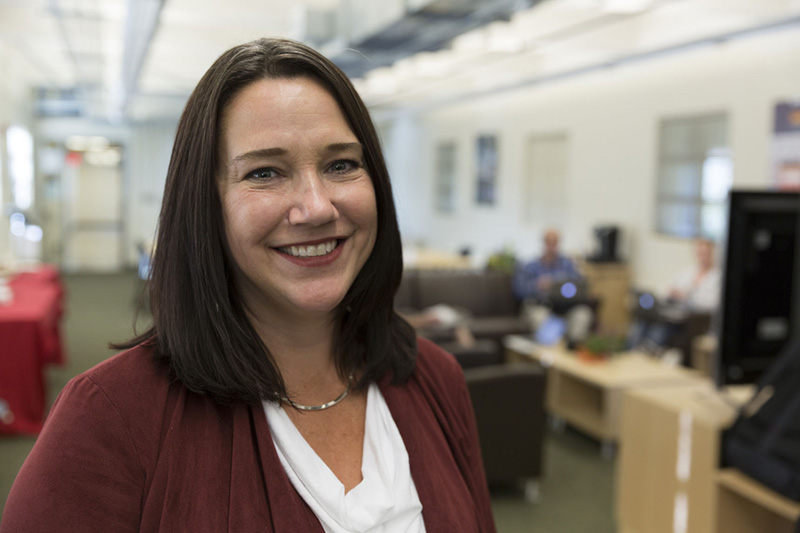Michelle Pacansky-Brock is helping faculty and students break barriers using technology
By Marya Jones Barlow

From a home office nearly 400 miles away, Michelle Pacansky-Brock is revolutionizing online learning for CI faculty and students. In faculty development workshops ranging from one-on-one sessions to online classes, she shares the many ways online learning can not only be interactive but also active, fun, intimate and empowering.
“Getting rid of those four walls supports endless learning opportunities and all the differences that students bring to a classroom,” she said. “You can design a class in a way that allows you to hear all of their voices. Students can interact with each other, share content, receive feedback, even engage in mobile field trips. It’s a different way of imagining learning, but so much more powerful and inclusive.”
A Teaching & Learning Innovation Specialist at CI since 2014, Pacansky-Brock is part of the Teaching & Learning Innovations team with Jill Leafstedt, Executive Director of Teaching & Learning Innovations and Senior Academic Technology Officer, Kristi O’Neil-Gonzalez, Instructional Technologist, and Michael McGarry, Instructional Technologist. The team supports faculty with transforming their teaching and students’ learning using technology.
Pacansky-Brock brings years of experience as a nationally recognized speaker, author, blogger and authority on “humanizing” online learning to the university. She shares her expertise and enthusiasm in classes called How to Humanize Your Online Course, How to Design Your Online Course, and Designing Engaging Online Activities, all offered through CI’s Online Teaching Preparation Program. She also offers individual online consulting sessions and meets regularly with instructors in Zoom, an internet-based conferencing system, and during visits to campus to facilitate connections and sharing between faculty. The second edition of her book, “Best Practices for Teaching with Emerging Technologies,” is set to publish next spring.
“I believe that being an educator today is a gift, as we are amidst the greatest learning revolution in history,” she said. “Technology will continue to enable a future where learning is inclusive and accessible to all, but teachers — not tools — will fuel this shift. Designing human-centered learning experiences is our new focus.”
Pacansky-Brock’s fans include Assistant Professor of English and Composition Director Stacey Anderson, who redesigned her first-year composition and upper-division interdisciplinary writing classes with digital tools and now coaches other CI faculty. Anderson said web-based tools have made it easier to explain expectations, hold students accountable, share and review writing progress, create peer interaction, and, most encouragingly, improve students’ passing rates.
“What’s amazing is that students who may not participate in a traditional, face-to-face class discussion are often more comfortable making contributions in an asynchronous, online environment, where they don’t feel the pressure of a ‘live’ conversation,” Anderson said.
“Similarly, students who are accustomed to writing with their instructor as their target audience thrive when they are asked to write in an online medium where their readers will include not only their classmates but also anyone else who happens to encounter their blogs. Students write much more interesting prose when they anticipate sharing their work with actual readers.”
For more information visit: www.csuci.edu/tli/online-blended
Return to the Table of Contents
© Fall 2016 / Volume 20 / Number 02 / Bi-annual
